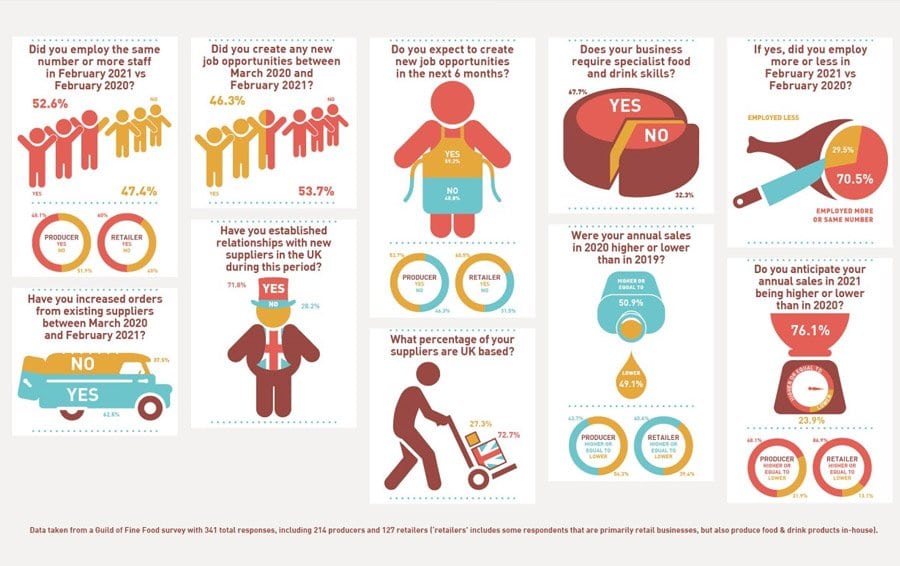The results of a survey into independent food and drink during the COVID-19 pandemic have been published by the Guild of Fine Food, highlighting the sector’s overwhelmingly positive impact on regional employment and domestic supply chains, as well as its role in safeguarding specialist food and drink skills. Supported by Food from England, Food & Drink Wales and Invest Northern Ireland, the survey is based on the experiences of both retailers and producers between February 2020 and February 2021.
The Guild of Fine Food is now urging the government to provide further support for this sector, after it proved itself during the crisis, to help ensure that independent businesses are at the heart of policy making as the reimagined landscape of British food and drink takes shape. Set against the backdrop of continuing uncertainty surrounding smaller scale exports to the EU post-Brexit and the impact this could have on the reputation of British food and drink on the continent, these findings will be used to keep the sector’s values front and centre in politicians’ minds as trade deals are struck and recovery plans are put into place.
While unemployment across the country saw a sharp increase during the period, 60% of the retailers surveyed employed more or the same number of staff in February 2021 compared to a year earlier, evidencing the fact that independent retail has helped keep people in jobs. Producers fared slightly worse at 48.1%, following the impact of repeated hospitality closures during lockdown. 46.3% of those surveyed created new job opportunities during the same period, while 59.2% expect to recruit for new roles in the next six months. These findings show how the sector is providing viable career options, especially for younger candidates, and highlight the need for recognised training and apprenticeship schemes to support such career paths.
When asked about roles requiring specialist food and drink skills, including butchery, cheesemaking and a wide range of traditional artisan crafts, 67.7% of respondents said that they required such skills. Of these businesses, 76.9% of retailers and 66.9% of producers employed more or the same number of these employees in February 2021 compared to February 2020, illustrating the sector’s vital role in preserving, teaching and encouraging the food specialisms that have come to define the best of British food and drink.
As the sector performed relatively well during the challenges presented by repeated lockdowns, with 50.9% reporting higher or equal annual sales in 2020 compared to 2019, this also had a hugely beneficial impact on British businesses within the supply chain. Respondents reported an average of 72.7% UK-based suppliers, with 62.5% increasing orders from existing suppliers and 71.8% establishing relationships with new suppliers in the UK during the surveyed period, meaning a much better domestic circulation of any pound spent in SMEs compared to larger corporate retailers.
Looking to the future, levels of optimism are extremely high, with 86.9% of retailers anticipating greater or equal annual sales in 2021 compared to 2020, making them prime candidates for the revitalisation of UK high streets if the government sees it fit to consider incentives for landlords to support independents rather than big chains. 68.1% of producers also expect an increase in annual sales, which could be further boosted by affordable town centre retail spaces for the independent retailers that sell their products.
John Farrand, managing director of the Guild of Fine Food, commented: “Having stood side-by-side with independent retailers and producers throughout the events of the past year, the results of this survey come as no surprise. We know the lengths they have gone to in order to keep their teams intact and serve their local communities, so we now urge the government to recognise the sector’s contribution to the cause during the crisis and ramp up its support as we move into the recovery stage. Our survey findings serve as a timely reminder that these businesses are the lifeblood of both our local high streets and our food and drink culture, so we’re calling on government to look at incentives to address the disparity on rates that has led to the high street seemingly bearing the brunt of the out-of-town supermarket where the charges are disproportionate and online sales where rates don’t exist at all. We know that consumer demand for well-made, local and regional food and drink has helped keep people in jobs, circulate the local pound and avoid the monotony of mass production – and we now have the numbers to back that up. As we find our way following the inevitable backlash of the pandemic and our exit from Europe, these are the businesses that can ensure a diverse, healthy and sustainable future for food and drink across the UK.”
Rachel Mallows, founding member of Food from England and director of Made In Northamptonshire, added: “Having witnessed the blossoming relationship between shoppers and independent food and drink retailers throughout the COVID-19 crisis, the results of this survey illustrate what this shift in consumer spending habits means for careers, skills and regional economies. By providing further assistance to local retailers as we seek to rebuild the high street on a firmer footing, the government has the opportunity to support local producers in the process, ensuring the preservation of crafts such as jam-making, cheesemaking and brewing that are integral to our reputation as a food nation.”
The full results of the Guild of Fine Food’s SME food & drink sector research can be requested by emailing [email protected].






